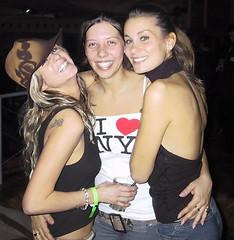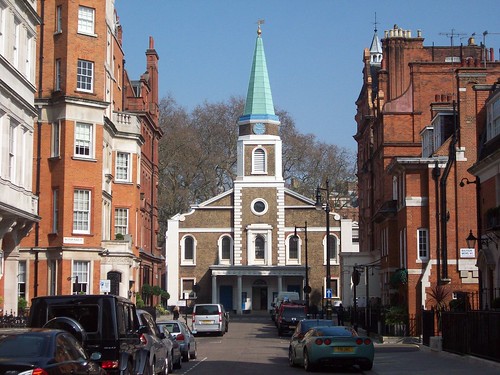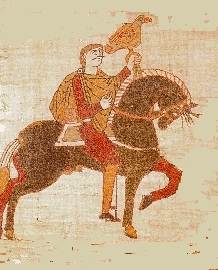Samuel Johnson, when given the task of writing the life of Ambrose Philips, dispatched of the subject--and dispatched is definitely the operative word--in eight pages. Of the Pastorals, he says they "might have long passed as a pleasing amusement, had they not been unhappily too much commended"; of Philips's career as a whole, that "he has added nothing to English poetry, yet at least half his book deserves to be read." Philips was friends with and of the same (Whig) political faction, passions being especially feverish at the time on both sides, as Addison and Steele, who praised and promoted his literary efforts in the Spectator and other of their papers. From around 1709-13 he was "high in the ranks of literature. His play (The Distressed Mother, "almost a translation of Racine's Andromaque") was applauded; his translations from Sappho had been published in The Spectator; he was an important and distinguished associate of clubs witty and political...", and for a time the mortal archenemy of the then very young and brash Pope. His fame faded quickly. He brought out a couple of tragedies in 1722, The Briton and Humphry Duke of Gloucester, the first of which, Johnson wrote in 1778-9, was "now neglected" and the second "only remembered by its title." In 1726 Philips took a position as Secretary to Lord Chancellor in Ireland, and went on to be a Prerogative Judge and an MP for Ireland--all patronage jobs, of course, before returning to his native country a year before he died of a palsy at age 74 in 1749. He does not seem to have added much substantial writing to his corpus during the last 27 years of his life.
Picture 1. There are no pictures of Ambrose Philips in circulation on the internet that I can find. A search for his name turns up these girls, among other unrelated things.
 I have a tendency to linger sometimes over the biographical details of such writers as I come across who once had a name and for a time a not insignificant place among the leading lights of their day, but had already faded into near total obscurity in the consciousness of the world long before they died. That I have read Philips's short book--the whole poem is about 20 pages long--myself is a matter of mere dumb luck. There is a passage from the poem in the GRE book which I take my reading list from which is not identified--the purpose of the question is to identify what type of poem the various selections are, lyric, elegiac, pastoral, etc. If it weren't for the internet, which the book I use predates, I would never have found out where it was from, and indeed, could not have read it, for I have never seen a copy of it in print anywhere, and the copy which is reproduced online looks to be the edition which Johnson wrote the prefaces for (I would link to it, but the URL is the length of a city block). While it is a much abused work, and probably not really worth reading unless you are undergoing a kind of lifelong graduate program in English literature, I liked it. To read it is not to get an especially vivid picture of a singular personality, or even of an historical period, but it does help to fill in one's sense of what the background was like, and against and out of which the striking literature and historical movements of the time arose.
I have a tendency to linger sometimes over the biographical details of such writers as I come across who once had a name and for a time a not insignificant place among the leading lights of their day, but had already faded into near total obscurity in the consciousness of the world long before they died. That I have read Philips's short book--the whole poem is about 20 pages long--myself is a matter of mere dumb luck. There is a passage from the poem in the GRE book which I take my reading list from which is not identified--the purpose of the question is to identify what type of poem the various selections are, lyric, elegiac, pastoral, etc. If it weren't for the internet, which the book I use predates, I would never have found out where it was from, and indeed, could not have read it, for I have never seen a copy of it in print anywhere, and the copy which is reproduced online looks to be the edition which Johnson wrote the prefaces for (I would link to it, but the URL is the length of a city block). While it is a much abused work, and probably not really worth reading unless you are undergoing a kind of lifelong graduate program in English literature, I liked it. To read it is not to get an especially vivid picture of a singular personality, or even of an historical period, but it does help to fill in one's sense of what the background was like, and against and out of which the striking literature and historical movements of the time arose.A small selection of my favorite lines:
45-6: "The jolly grooms I fly, and all alone/To rocks and woods pour forth my fruitless moan"
73-76: "Nor will I cease betimes to cull the fields
Of every dewy sweet the morning yields:
From early spring to autumn late shalt thou
Receive gay girlonds, blooming o'er thy brow."
In Facebook parlance, I noted that I liked this.
53-4, we get the usual stuff of the genre, though the forgiving reader welcomes it as an old acquaintance so long as it is one he only has to come across once in a while:
"Thy virgin-bloom will not forever stay,
And flowers, though left ungather'd, will decay..."
A couple I found humorous:
23-6: "And now the moon begins in clouds to rise;
The brightening stars increase within the skies;
The winds are hush; the dews distil; and sleep
Hath clos'd the eyelids of my weary sheep..."
105-8: "O, killing beauty! and O, sore desire!
Must then my sufferings, but with life, expire?
Though blossoms every year the trees adorn,
Spring after spring I wither, nipt with scorn..."
A little of this is rather pleasant in small doses, with one's ice cream or snifter of brandy before bed.
Picture 2. This is the Grosvenor Chapel on South Audley Street in Mayfair, London, where Philips was, and I presume still is, buried, though you never know (Laurence Sterne's grave, for example, was relocated in the late 1960s when they paved over the cemetery where he had orignally been laid). I haven't been there, but either the angle is good or that is one nice-looking street for modern-day London.
 In the competitive and manly world of 18th century English poetry, Philips was given the appellation of "Namby-Pamby" for the apparent low levels of testosterone that fueled most of his work, especially his lighter verses. The bestower of this appellation most scholars believe now to be Henry Carey, a work of whose we will be getting to ourselves very shortly. Johnson seemed to think it originated from Pope, or his circle. Pope, you will recall, was around 4 foot 8 and a very fragile 90 pounds or so at his most robust, but the vitriol he was capable of extending towards his rivals certainly belied this apparent disadvantage. Philips, while an inferior poet, at least did not suffer these insults like a wuss. Johnson notes that "Of his personal character all I have heard is, that he was eminent for bravery and skill in the sword, and that in conversation he was solemn and pompous". Oh, and he "hung up a rod at Button's (presumably a coffeehouse), with which he threatened to chastise Pope." Pope then called him a rascal in print. Time, however, has rendered these once raging animosities rather quaint. It is true though, in most fields, that it is a good sign of health when the most prominent people in it are dissing their rivals incautiously and giving them derogatory nicknames. The most prominent ornery person in this regard on the comptemporary scene is probably the critic William Logan, but one doesn't even see him threatening to club Billy Collins outside of Fitzgerald's pub or wherever the poets go nowadays. There are a lot of angry contemporary poets, it is true ("I long to murder the anonymous white male sitting beside me"), but their open anger at least seems to be directed out towards society and the anonymous inchoate masses rather than towards each other--one can't alienate one's network for grants, awards, teaching posts, fellowships, and the like, I suppose.
In the competitive and manly world of 18th century English poetry, Philips was given the appellation of "Namby-Pamby" for the apparent low levels of testosterone that fueled most of his work, especially his lighter verses. The bestower of this appellation most scholars believe now to be Henry Carey, a work of whose we will be getting to ourselves very shortly. Johnson seemed to think it originated from Pope, or his circle. Pope, you will recall, was around 4 foot 8 and a very fragile 90 pounds or so at his most robust, but the vitriol he was capable of extending towards his rivals certainly belied this apparent disadvantage. Philips, while an inferior poet, at least did not suffer these insults like a wuss. Johnson notes that "Of his personal character all I have heard is, that he was eminent for bravery and skill in the sword, and that in conversation he was solemn and pompous". Oh, and he "hung up a rod at Button's (presumably a coffeehouse), with which he threatened to chastise Pope." Pope then called him a rascal in print. Time, however, has rendered these once raging animosities rather quaint. It is true though, in most fields, that it is a good sign of health when the most prominent people in it are dissing their rivals incautiously and giving them derogatory nicknames. The most prominent ornery person in this regard on the comptemporary scene is probably the critic William Logan, but one doesn't even see him threatening to club Billy Collins outside of Fitzgerald's pub or wherever the poets go nowadays. There are a lot of angry contemporary poets, it is true ("I long to murder the anonymous white male sitting beside me"), but their open anger at least seems to be directed out towards society and the anonymous inchoate masses rather than towards each other--one can't alienate one's network for grants, awards, teaching posts, fellowships, and the like, I suppose.

























